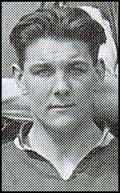Billy Brown

William (Billy) Brown was born in Hetton-le-Hole, County Durham, on 22nd August, 1900. He played amateur football for Hetton before joining West Ham United in 1920. An inside-forward he joined a team included Syd Puddefoot, Jimmy Ruffell, George Kay, Edward Hufton, Jack Tresadern, Vic Watson, Sid Bishop, Billy Moore, Dick Richards, Jack Young and Billy Henderson.
Brown made his debut against South Shields on 7th May 1921. The following season he played in only seven games. However, he became a regular member of a forward line that included Jimmy Ruffell, Billy Moore, Dick Richards and Vic Watson.
West Ham United enjoyed a good FA Cup run in the 1922-23 season beating Hull City (3-2), Brighton & Hove Albion (1-0), Plymouth Argyle (2-0), Southampton (1-0) and Derby County (5-2) to reach the final against Bolton Wanderers. The final took place at Wembley Stadium, only four days after the stadium had been completed.
The stadium had a capacity of 125,000 and so the Football Association did not consider making it an all-ticket match. After all, both teams only had an average attendance of around 20,000 for league games. However, it was rare for a club from London to make the final of the FA Cup and supporters of other clubs in the city saw it as a North v South game. It is estimated that 300,000 people attempted to get into the ground. Over a thousand people were injured getting in and out of the stadium. When the game eventually got started, Joe Smith and David Jack scored in Bolton's 2-0 victory over West Ham United.
In their next game West Ham United beat Sheffield Wednesday 2-0 to ensure promotion to the First Division. Brown had scored 12 league and cup goals that season. Other scorers included Vic Watson (27), Billy Moore (20), Jimmy Ruffell (7), Dick Richards (6) Sid Bishop (2) and Jack Tresadern (2).
Brown won his first international cap for England against Belgium on 1st November 1923. Brown scored a goal in the 2-2 draw but was never selected again.
West Ham United finished in 13th place in their first season in the First Division. Brown managed to score 6 goals in 26 league games. He was transferred to Chelsea soon afterwards. Brown scored on his debut against West Bromwich Albion but had difficulty retaining his first-team place. After scoring 21 goals in 57 games he moved to Fulham in 1929. He also played for Stockport County (1930-31) and Hartlepools United (1931-32).
After retiring from football Billy Brown worked as a baths superintendent at Easington Colliery. He also stood as a cricket umpire for many years.
William Brown died in County Durham in 1985.
